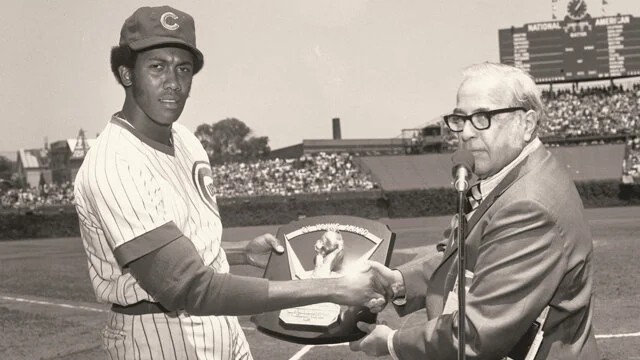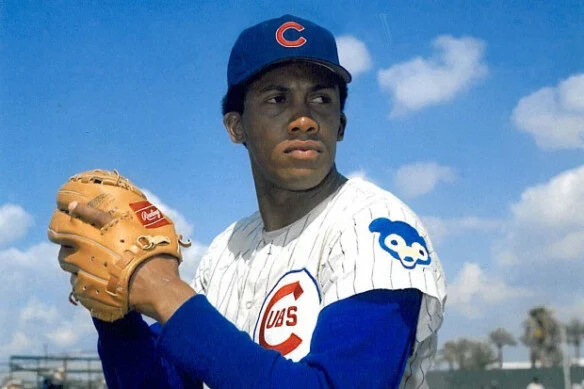Flashback: 49 years ago, Jenkins becomes first Canadian to win Cy Young Award
Fergie Jenkins is presented with the 1971 National League Cy Young Award at Wrigley Field. Photo: Canadian Baseball Hall of Fame
October 31, 2020
By Kevin Glew
Canadian Baseball Network
It took him until his fifth consecutive 20-win season, but in 1971, Fergie Jenkins finally received the National League Cy Young Award.
With the announcement, which formally took place on November 3, 1971, the 6-foot-5 Chatham, Ont., native, became the first Canadian to capture the honour.
“Yes, winning the Cy Young means very much to me,” Jenkins told The Windsor Star on the day he was announced as the recipient. “It is the supreme award for a pitcher and it gives you a great deal of satisfaction when you realize the amount of work it took to win it.”
Photo: Canadian Baseball Hall of Fame
Jenkins had finished runner-up to San Francisco Giants lefty Mike McCormick for top pitcher honours in 1967 and in third place in 1970 when St. Louis Cardinals ace Bob Gibson took home the hardware.
But his 1971 numbers made him impossible for baseball writers to overlook.
While toeing the rubber for a third-place Chicago Cubs team that season, Jenkins topped the National League in wins (24), innings pitched (325), starts (39) and complete games (30). He also finished second to Tom Seaver in strikeouts with 263.
“It was my best season for wins, productive wins, innings pitched and control,” Jenkins told The Canadian Press. “The biggest things for a pitcher are control and concentration and I had both this year.”
Jenkins was the first-place selection on 17 of the 24 writers’ ballots cast, while Seaver received six first-place votes.
The Canuck right-hander gave much of the credit for his success to former Cubs pitching coach Joe Becker.
“Joe told me he was going to make me a million dollars in the big leagues,” Jenkins told The Canadian Press. “He said the only way a winning pitcher could make any money was to work every fourth day, go out there and throw hard, throw strikes and concentrate all the time. I tried to cut down on walks, get strikeouts when I needed them and tried to pitch a shutout every time I went out there.”
Jenkins also told reporters that he was confident the award would help him secure a $100,000 salary for 1972. He had made $92,500 in 1971.
“It’s like a big star up there beside my name,” Jenkins said of winning the Cy Young Award. “It gives me all the more bargaining power.”
For the record, Jenkins did secure the $100,000 salary he was seeking. According to his 2009 biography, Fergie: My Life from the Cubs to Cooperstown, he signed a two-year, $250,000 deal with the Cubs prior the 1972 campaign.
Jenkins was back home in Chatham, Ont., when he was informed he had won the award. He told The Windsor Star that he planned to spend the off-season with his father and his wife, Kathy, and two young daughters, Kelly and Delores. One of his plans was to rent a cottage on Lake St. Clair and do plenty of hunting and fishing.
When he returned to the mound in 1972, Jenkins recorded his sixth straight 20-win season and finished third in the Cy Young Award voting behind Cardinals southpaw Steve Carlton, the winner, and Pittsburgh Pirates right-hander Steve Blass.
After a 14-win season with the Cubs in 1973, Jenkins was dealt to the Texas Rangers for third baseman Bill Madlock and utility player Vic Harris. In his first year with the Rangers, Jenkins set career-highs with 25 wins and 328-1/3 innings pitched. He also topped the American League with 29 complete games and finished second to Catfish Hunter in the Cy Young Award voting.
He added 17 wins in his second season with the Rangers before he was dealt to the Boston Red Sox prior to the 1976 campaign. After two seasons in Beantown, he returned to the Rangers and was a key starter for them from 1978 to 1981. He completed his big league career with the Cubs in 1982 and 1983.
Jenkins retired with 284 major league wins – more than double the number any other Canadian has accumulated – and as the only pitcher in history to register more than 3,000 strikeouts (3,192), while allowing fewer than 1,000 walks (997). Greg Maddux, Pedro Martinez and Curt Schilling have since joined that elite group.
For his efforts, he was inducted into the Canadian Baseball Hall of Fame in 1987 and into the National Baseball Hall of Fame in Cooperstown in 1991, becoming the only Canuck to be so honoured.
For a close-up look at Jenkins’ 1971 Cy Young Award, you can view it at the Canadian Baseball Hall of Fame in St. Marys, Ont.
Photo: Canadian Baseball Hall of Fame




